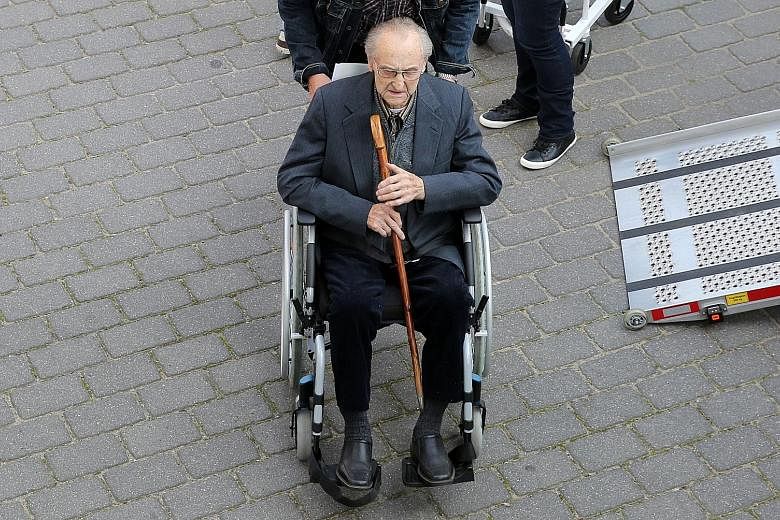More than 70 years after the end of World War II, a former SS medic at Auschwitz will face trial as Germany races to prosecute ageing Nazis.
The case follows two other prosecutions in which the defendants were convicted for complicity in the murders of hundreds of thousands of inmates at the Nazi death camp in occupied Poland.
These last-gasp trials come at a time when Germany is grappling with a new surge in support for right-wing populism that has Berlin mayor Michael Mueller issuing a warning to voters ahead of state polls in the capital yesterday.
A double-digit score for the anti-immigrant party Alternative for Germany (AfD) would be "seen as a sign of the resurgence of the right and Nazis in Germany", he said.
While Germany is vastly different from what it was in the pre-war 1930s, some observers note that these belated Nazi trials are a stark reminder of how dangerous xenophobic rhetoric can become.
Today, former medical orderly Hubert Zafke, 95, will face the court on charges of complicity in the murders of 3,681 inmates in a case that had been postponed three times due to his poor health.
The case could well be suspended again after a doctor gives an assessment of Mr Zafke's health.
Prosecutors, however, want the trial to go on, arguing that Mr Zafke is using his old age to avoid answering for the heinous crimes. They have also filed a motion for the judge to recuse himself, accusing him of a lack of desire to pursue the case.
So why are the trials so late in coming?
In the years immediately after WWII, Allied powers held major trials that convicted leading Nazis.
But after West Germany came into being in 1949, the government of the young democracy had the gargantuan task of rebuilding a shattered country, and prioritised that above prosecuting lower-ranking Nazis, especially as doing so would have meant putting much of the country on trial.
Prosecutors also faced a higher burden of proof, and had to prove direct links between the accused and victim before the former could be convicted.
All that changed in 2011, when a German court set a legal precedent by convicting John Demjanjuk, a former guard at the Sobibor death camp, simply on the basis that he had served at the Nazi-run site.
"From that point, the German authorities decided that they were going to basically prosecute those remaining Nazi criminals who even then... were well into their 80s for the most part, if not older. Which is how we got to where we are," Mr Menachem Rosensaft, general counsel at the World Jewish Congress, told The Straits Times.
In June, former Auschwitz guard Reinhold Hanning, 94, was found guilty of complicity in 170,000 murders. Last year, Oskar Groening, 95, known as the "Bookkeeper of Auschwitz", was sentenced to four years in jail for complicity in at least 300,000 murders. He had worked in the death camp counting money confiscated from prisoners.
Germany's top Nazi investigator Jens Rommel said another four men and four women have been identified, suspected of having worked at a concentration camp near Gdansk in occupied Poland.
But prosecutors are racing against time. Some trials could not start because the defendants died. And even those convicted do not go to jail due to their advanced age.
So why is Germany expending so much effort on these cases?
Arguing for the need to keep pursuing these late cases, Sueddeutsche Zeitung columnist Robert Probst wrote that the trials are necessary to give the victims a voice.
"They want to look the perpetrators in the eye, they want to hear their explanations; they want justice but rarely retaliation; they see it as their duty to keep the memory alive. The trials guarantee them attention," he wrote.
For Auschwitz survivor Leon Schwarzbaum, 94, it is pure justice.
"It is only just for these trials to be carried out so many years on. Because they participated (in the crimes). I have always been asked if I knew an SS man who was humane. I did not," he told journalists.
Mr Rosensaft, whose parents were interned in Auschwitz and Bergen-Belsen, and who was born in a displaced people's camp in Bergen-Belsen three years after the war ended, agreed.
"The alternative would be to let individuals who participated in genocide, who were complicit in genocide... get away with it," he said.
"It is a matter of simple justice that even at this late date, there has to be a price to pay when you are a willing participant in a genocidal enterprise."
At a time when anti-migrant sentiment is rising in Europe amid a record influx of refugees, they also serve as a useful lesson, he noted.
"It's a worthwhile reminder especially to younger generations that this type of xenophobic hatred that one saw in the 1930s and 1940s and that is resurging now in parts of the world, especially Europe, and instead of directed against Jews, is directed against Muslims or against immigrants or against refugees, this type of hatred does not end with rhetoric," said Mr Rosensaft.
"These individuals who look old and frail were in fact at one point part of the logical conclusion of xenophobia and this kind of fascist political extremism."

